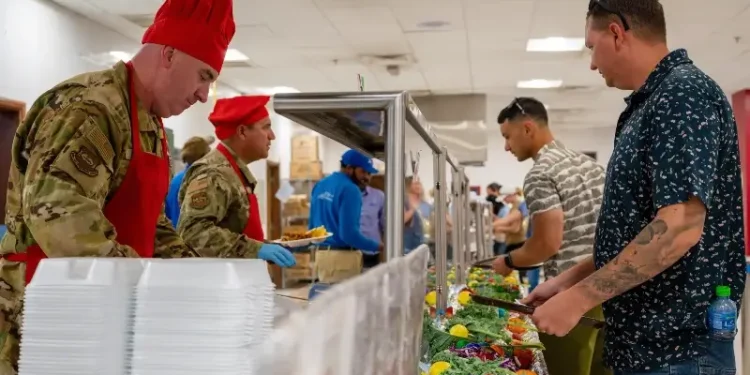The U.S. Department of Defense recently released a press statement highlighting the diverse use of military slang across its branches, including the Army, Navy, Air Force, Marine Corps, and Coast Guard.
This linguistic diversity reflects the unique cultures within each branch and underscores the importance of effective communication in military operations.
Understanding Military Slang
Military slang serves as a vital tool for communication among service members. It includes terms related to ranks, deployments, and daily operations.
The Army and Air Force share many slang terms due to their similar operational environments. In contrast, the Navy, Marine Corps, and Coast Guard often use nautical terms reflecting their maritime focus.
This specialized language helps create a sense of camaraderie and identity within each branch. It also facilitates quick and efficient communication during missions where time is critical.
Understanding these terms can provide civilians with insights into military culture and operations.
Military Slang: Ranks and Training Titles
| Service Branch | Rank/Title (Official) | Informal Slang Term | Context of Use |
|---|---|---|---|
| Navy/Coast Guard | Senior Chief Petty Officer | Senior | Informal reference to senior enlisted |
| Marine Corps | Gunnery Sergeant | Gunny | Widely used nickname |
| Marine Corps | Master Sergeant | Top | Informal among enlisted ranks |
| Marine Corps | Master Gunnery Sergeant | Master Guns | Used within Marine Corps |
| Marine Corps | Warrant Officer | Gunner | Role-specific nickname |
| Marine Corps | Captain | Skipper | Command context |
| Navy | Ship Captain | Skipper | Captain of a ship |
| All Marines | General nickname | Leatherneck, Devil Dog | Heritage-based nicknames |
| Army/Air Force | Any Sergeant and Above | Sarge | Common informal title |
| Army | Master Sergeant | Top Sergeant | Used informally by peers/subordinates |
| Air Force | Senior Master Sergeant | Top Sergeant | Similar informal usage |
| Training Instructors | Various Roles | See below | Role-specific terminology |
| Navy | Recruit Trainers | Recruit Division Commanders | Entry-level training role |
| Marines (Enlisted) | Recruit Trainers | Drill Instructors | Highly formal and specific term |
| Marines (Officer) | Officer Trainers | Sergeant Instructors | Specialized training role |
| Coast Guard | Recruit Trainers | Company Commanders | Entry-level training |
| Army/Air Force | Recruit Trainers | Drill Sergeants | Common training title |
Cultural Insights
- Military slang reflects the unique culture of each branch.
- Shared terms between branches indicate operational similarities.
- Nautical terms are prevalent in maritime-focused branches.
- Slang enhances camaraderie among service members.
Operational Communication
The use of military slang is not just cultural but also operationally significant. It allows for concise communication during deployments and training exercises.
Each branch has specific terms for facilities and procedures that streamline operations by reducing misunderstandings.
Strategic Language Use
- Slang aids in rapid information exchange during missions.
- Branch-specific terminology reduces potential miscommunication.
- Cultural understanding improves civilian-military interactions.
- Linguistic diversity highlights operational differences among branches.
Common Military Slang: Deployment & Daily Life
| Term or Phrase | Meaning | Used By | Notes |
|---|---|---|---|
| Downrange | In the field or on deployment | Army, Marine Corps | General field deployment slang |
| Click | Kilometer (map distance) | Army, Marine Corps | Tactical term for measuring distance |
| Grunt | Infantry soldier | Army, Marine Corps | Used informally to refer to ground troops |
| Ruck March | Field hike | Army | Term for carrying a loaded pack |
| Hump | Field hike | Marine Corps | Equivalent to “ruck march” |
| Chart | Nautical map | Navy, Coast Guard | Used in sea navigation |
| Nautical Mile | Marine distance measurement | Navy, Coast Guard | Equivalent to 1.15 statute miles |
| Head | Bathroom | Navy, Coast Guard | Nautical term |
| Latrine | Bathroom | Army, Air Force | Land-based services term |
| Chow Hall/Mess Hall | Dining facility | Marine Corps | Informal usage |
| Galley | Dining facility | Navy | Nautical dining area term |
| DFAC | Dining Facility | Army, Air Force | Common abbreviation |
| Article 15/NJP | Nonjudicial punishment | All services | Called office hours by Marines |
| 72/96 | 3- or 4-day weekend liberty | Marines | Equivalent to a pass in other branches |
| Pass | Short leave | Army, Navy, Air Force | Standard term for brief time off |
| Squared Away | Looking sharp and professional | All branches | High praise for readiness and appearance |
Additional Reading
Parting Shot
The exploration of military slang offers valuable insights into the cultural dynamics within U.S. armed forces.
By understanding these unique linguistic elements, both service members and civilians can enhance their communication skills, fostering better collaboration across different sectors involved in national defense efforts.
Sources: U.S. Department of Defense, YourDictionary Article on Military Slang Sayings, and Military.com Article on Military Terms and Jargon.
Prepared by Ivan Alexander Golden, Founder of THX News™, an independent news organization delivering timely insights from global official sources. Combines AI-analyzed research with human-edited accuracy and context.









